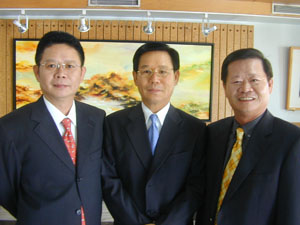Tong Yang Expands at Seven Sites to Meet Growing Demand
Car parts maker's capital expenditure
2010/04/07 | By Quincy LiangSoon after announcing that its flagship firm Tong Yang Industrial Co. and affiliate Taiwan Kai Yih Industrial Co. would merge in September 2010, the Tong Yang Group, one of the largest auto-parts conglomerates in Taiwan, announced that it would budget NT$2 billion (US$615.4 million at NT$32.5:US$1) for capital spending in 2010. The money will be used to expand the capacity of seven group affiliates.

The Tong Yang Industrial Co. is the world's largest supplier of aftermarket (AM) plastic auto body parts, and a major supplier of original equipment (OE) body parts to all top automakers in Taiwan and China. Kai Yih is a major producer of AM sheet-metal body parts, with subsidiaries and joint ventures in China that supply OE parts to carmakers there.
The Tong Yang Group has been working hard to diversify its product line in recent years, for example by establishing the Rising Sun Heat Exchanger Industry Co. to produce a complete line of radiators, air-conditioner condensers, fuel tanks, and radiator fans.
Among the group's goals for 2010, according to its president, Raymond Wu, are more than NT$10 billion (US$307.7 million) in revenue from its 17 subsidiaries and joint ventures in China and consolidated group revenue of more than NT$35 billion (US$1.08 billion)—up from about NT$30 billion (US$923 million) in 2009.
In another development, Wu announced that his younger brother Cristin, currently group vice president and also vice president of Tong Yang Industrial, would take over as group president in September 2010. Raymond Wu himself will move to the position of group vice chairman.
Expanding Capacity
Wu says that the demand for Tong Yang's AM parts began turning upward in the fourth quarter of 2009, and that the improvement is expected to continue into the first quarter of 2010. This will leave the group with a capacity shortfall of about 20%, and as a result the group will carry out expansions at seven plants around the world.
Among these expansion projects, the capacity of Tong Yang Industrial's Tainan facility will be boosted from 4.8 million units annually to 6.6 million units in the first quarter of 2010. The capacity of Kai Yih's Tainan plant will be increased from about 2.4 million units now to 3.6 million units in the second quarter.
AM-parts factories in China, Thailand, and Italy will also be expanded. The Nanjing Tong Yang Plastics Co. in China's Jiangsu Province will begin mass production of AM parts in June this year, in April an Italian plant is scheduled to kick off production of parts for the European market, and a planned new plant in Thailand will supply the ASEAN AM-parts market.
To supply the OE-parts market in China, which has the fastest-growing auto market in the world, Tong Yang will ramp up annual production capacity at the Changchun Fawer Dongyang Plastic Product Co. from 500,000 units now to 940,000 in April. By June, it will boost the annual capacity of the Nanjing Niyang Auto Plastic Co. to 300,000 units annually, from 240,000 now.
Quoting statistics compiled by the China Association of Automobile Manufacturers (CAAM), Wu said that sales of new cars there were expected to top 12 million units in 2009 and 13.4 million units in 2010. This growth will help Tong Yang reap rich rewards from its China investments, which in the past have encountered difficult times.
Lengthening the Lead
As he faces the prospect of becoming Tong Yang's new president in September, Cristin Wu says that the merger between Tong Yang Industrial and Kai Yih will further lengthen the group's lead over its competitors in the AM parts business.
Cristin Wu is optimistic about the group's future operations, not only because global demand for AM parts is growing but also because Tong Yang's continuously improving quality image is attracting more and more orders for OE parts. “In addition to the rapid growth in OE-parts sales to Chinese automakers,” he comments, “orders from Japanese and American automakers are also increasing.”
He reports that Tong Yang has no current plans to add more production bases in China, but that capacity at existing bases will be expanded to meet the needs of regional demand. “In China,” he says, “all of our production bases have a campus area of more than 10 acres, so we have plenty of land left for further expansion.”
Three Brothers
The Tong Yang Group's increasingly solid image in the global auto parts industry has drawn attention to its “three brothers,” or “Iron Triangle,” management model. The eldest brother is Michael Wu, a refined and polite gentleman who is responsible for the group's financial affairs. Raymond Wu is the second brother, a smart, farsighted person who is responsible for the group's long-term planning and development. The youngest Wu brother is Cristin, a man with a strong will and the ability to use scientific management to carry out company policies.
Each of the three brothers has his own particular talents, Cristin Wu says, and the talents of the three are complementary. Close cooperation in an attitude of humility, he stresses, brings greater power and effectiveness to their joint management.




